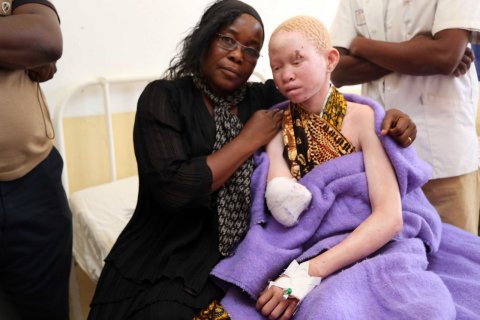Albinism in Africa: a medical and social emergency

People with albinism (PWA) face a variety of medical and social problems, ranging from poor vision and skin cancer to murder for their body parts for witchcraft in East Africa, notably Tanzania. Albinism is an inherited disorder of melanin biosynthesis that results in a variable phenotype classified according to the mutation in one of several genes.
All forms of albinism are associated with problems of the visual system resulting in abnormalities of the retina, nystagmus, strabismus, foveal hypoplasia, abnormal crossing of the optic fibers, photophobia and reduced visual acuity.
In addition to their vision problems, PWAs are also highly susceptible to skin cancer with high rates of squamous and basal cell carcinoma. Sunscreens are expensive and often unavailable in many parts of Africa, so health intervention strategies mainly focus on encouraging sun avoidance and protection from an early age. Historically, some tribes have killed newborns with albinism and those that survive are often discriminated against as marriage partners.
Sadly, in the past few years, PWAs in Tanzania face an additional threat. They are being murdered at an alarming rate for their body parts (primarily bones and hair) used for witchcraft purposes. Local superstition holds that the bones, hair and other body parts of a PWA can be used in potions believed to be magical for success in finding things, such as in mining. In the past, obtaining of body parts was largely limited to grave robbing, but living people are increasingly targeted now for murder and mutilation for their body parts. In particular, the bones of a PWA are quite valuable for these witchcraft uses, with the highest price paid for the bones of children.
PWAs face enormous challenges in East Africa. They have very poor, uncorrectable vision and, as a result, they are disadvantaged in schools and in employment opportunities. At best, they are discriminated against; at worst, they are hunted and often killed for their body parts for witchcraft use. If they survive these attacks, they are very likely to develop skin cancer that is most often untreated, leading to a preventable premature death. However, awareness and activism can help PWAs to lead more normal lives by addressing their medical and social needs. Above all, we must all work to stop these atrocities against these people who suffer from a visible genetic condition.
Additional resources
There are NGOs and charitable organizations that advocate and defend PWAs. One shining example is Under the Same Sun that provides inclusive education and safe havens for PWA, especially children who are often abandoned. Under the Same Sun is dedicated to advocacy and education from the grassroots level to government officials and international powers such as the United Nations and the African Union. Indeed, with advocacy from Under the Same Sun, the National Organization for Albinism and Hypopigmentation (USA), World Albinism Alliance, Standing Voice and the Salif Keita Foundation, the United Nations Human Rights Commission recently launched a campaign against the violence of PWAs in Africa. Investigating these attacks requires a resolute, systematic and combined approach. Since the investigative skills of police and journalist are frequently inadequate (or even absent) in countries like Tanzania, a primary source of information comes from their ‘First Responder Team’ which visits victims of attack, including their families and community, to investigate and record all relevant data related to the reported attack.
Murray's editorial is freely available in full on our International Health website.
An excellent documentary on this subject called In The Shadow of the Sun was released in 2013; click here to see the trailer. And here's an interview with Peter Ash, the founder of Under the Same Sun.
Call for papers
Transactions of the Royal Society of Tropical Medicine & Hygiene and International Health are currently inviting submissions of original research papers and systematic reviews in albinism.
We publish high-quality articles with the aim of supporting the wider tropical medicine and global health community and future generations of academics, clinicians and scientists. We work hard to support our authors who trust us with their work. Here are just some of the benefits we offer:
- An average time to first decision of less than four weeks
- Expert international Editorial Boards
- A dedicated and expert in-house Editorial Team
- Advance online publication
- Full PubMed/Medline indexing for all articles
- A number of Open Access publishing options
- Support for research from low and middle-income countries
- Global dissemination of your research
- Promotion of your paper once published
- Both journals are ranked in the Science Citation Index
Take a look at our journals page to find out more and submit your paper.
